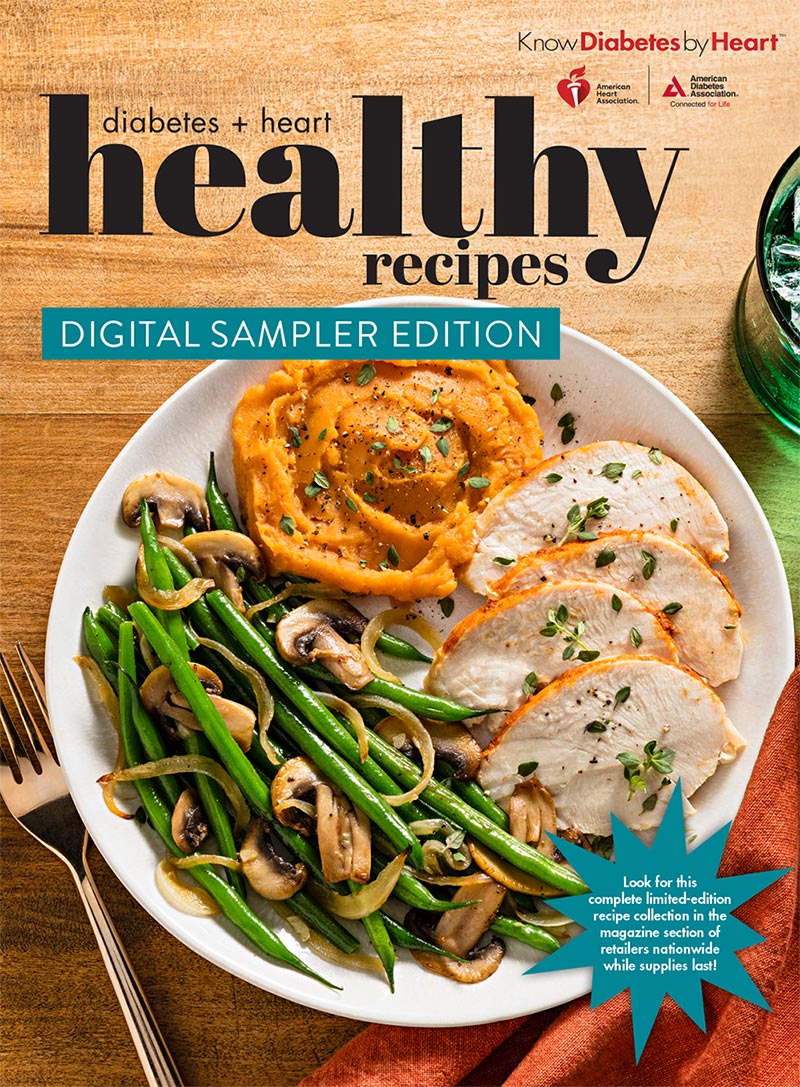Taking Care of Your Mental Health
For people living with conditions such as diabetes and heart disease, anxiety and stress can be overwhelming. Now is a good time to take a breath, look at some of your habits and see if you can make positive changes.

For example, are you staying up too late or overindulging in your favorite comfort foods? Is it hard to concentrate or make decisions? If so, you’re not alone. Here are some questions to help you gauge your level of anxiety:
- Are you overwhelmed with fear about your own health or that of your loved ones?
- Do you feel more anger, hostility or irritability than usual?
- Have you been neglecting routine hygiene and self-care?
- Are you having headaches, muscle tension, digestive issues or other physical symptoms?
- Have chronic health problems or mental health conditions worsened?
- Are you using alcohol, tobacco or other substances more frequently?
If stress interferes with your daily activities for several days in a row, call your health care provider.
Anxiety can make the best-laid plans fall apart. But it’s key for people with conditions like heart disease and diabetes to stick to their treatment plans and to consult their health care providers if they are struggling.
Meanwhile, there are a number of things you can do to help reduce your anxiety.
Here are some tips:
- Eat well and avoid alcohol and other substances.
- Get 7-9 hours of sleep each night.
- Stay physically active. Aim for 150 minutes of exercise each week.
- Try meditating, stretching, deep breathing, yoga, mindfulness or other stress-reduction techniques.
- Enjoy something that calms you like a hot bath, a nature walk, journaling or quiet time with pets.
- Set aside time for hobbies, music, movies or other enjoyable pastimes.
- Agree on a daily schedule for everyone in your household to help reduce day-to-day friction.
- Find people and things that make you laugh.
- Establish your own special space where you can quietly relax.
- Tackle things on your long-term to-do list, such as cleaning a closet or reorganizing your office.
- Connect with your usual support network as well as other loved ones, share how you feel.
- Find an online support group.
If you’re feeling overwhelmed by anxiety or sadness, contact your primary care provider, your health insurer or your employer’s Employee Assistance Program, if available, to find a mental health provider.
In an emergency, call:
- The federal government’s 24-hour Disaster Distress Helpline at 800-985-5990 (or text TalkWithUs to 66746).
- The 24-hour National Suicide Prevention Lifeline at 800-273-8255.
For More Information
Managing Mental Health During COVID-19
Tuesday, May 12, 2020
Watch the Video
There is a lot of uncertainty during the COVID-19 pandemic, which may lead to added stress on top of managing your diabetes. Our guest expert will talk about ways to cope and engage with your support systems when you may be physically distanced from friends and family.
How to Find Diabetes Support
Support Starts with your Healthcare Team
For diabetes care that will help you thrive, the right meds and habits can go a long way.
But a truly holistic plan doesn’t stop there – it also includes a strong support system. You may be doing great on your own for some things, but everyone struggles in some areas. Maybe you’re overwhelmed by all the information, or maybe you’re nervous about the future. It can often be stressful to manage everything.
We all need a little help and encouragement sometimes. Here are tips for building a support system to cheer you on, and give you the boost you need to stay motivated and positive.
Build your network
For support, you can look to people you know and trust or even expand your circles to include new friends. Everyone needs a shoulder to lean on and you might be surprised by how many people are willing to help. Some people who might be good partners on your journey:
- Family or friends who can make lifestyle changes with you.
- Friends or family who you can talk to, walk with and depend on when the going gets tough.
- A therapist who specializes in coping with health concerns or patient empowerment.
- Your doctor, or a specialist like a dietician or endocrinologist.
- A coach from a Diabetes Self-Management Education and Support service. Ask your doctor for a referral, sessions may be covered by insurance.
- Diabetes support communities are available for you at supportnetwork.heart.org or community.diabetes.org.
Healthy Lifestyle Goals
Some ways to build a healthy lifestyle with diabetes:
- Stay on top of your medications, appointments any other parts of your doctor-prescribed health plan.
- Eat smart with a diet full of fruits and vegetables, whole grains, lean protein and healthy fats.
- Move more with consistent daily exercise, aim for about 20-25 minutes per day.
- Keep a positive attitude – strive to have a healthy body with diabetes and make changes that can help get you there.
- Talk with others experiencing type 2 diabetes. You’re not alone and many people experience the same struggles and difficulties.
With your support network in mind, start with just one area that you’d like to improve. The others will soon follow. Rallying support can help you stay focused so you can make it happen. Find answers to your questions and sign up to receive our monthly email with science-backed tips, recipes and more below.
Prioritizing your mental health while managing diabetes and heart disease
Chronic health conditions such as heart disease and diabetes take more than just a physical toll.
Keeping up with doctor appointments, health numbers—glucose numbers, blood pressure numbers, weight and others—and making multiple decisions per day about meals and medications bring a unique mental burden for people who are managing both diabetes and heart disease.

Feeling overwhelmed “is not something that represents any kind of a failing,” said Jeffrey Gonzalez, professor of psychology at Yeshiva University and professor of medicine, epidemiology and population health at Albert Einstein College of Medicine. “It’s normal to be stressed about it and it’s not something that you have to hold back from health care providers. It comes with the territory.”
Gonzalez recommended that patients talk with their health care team about their feelings.
And, if appropriate, address signs of depression. Gonzalez noted that it can negatively impact quality of life and the ability to work, be productive and enjoy time with friends and family.
Kelly Close, founder of The diaTribe Foundation, a nonprofit diabetes advocacy organization, said that diabetes and heart disease can impact mental well-being even in people who aren’t clinically depressed.
Close said new medical advances, such as continuous glucose monitoring, can help some people manage the myriad daily decisions someone must make when living with diabetes. The wearable devices provide feedback about how meals, exercise and medication impact blood glucose (also called blood sugar) on a continuous basis. “We like thinking about what we can do in managing diabetes,” Close said.
Other things you can do, she says, are getting enough sleep, increasing physical activity and eating an appropriate diet.
Tips for managing type 2 diabetes-related stress
Movement: For mind and body
While aerobic exercise that gets the heart pumping appears to produce the most endorphins, the hormone associated with the so-called runner’s high, even light-intensity exercise is associated with well-being. Those activities might include taking a walk around the block, using the stairs instead of the elevator or gardening.
Eating for whole body wellness
Observational studies suggest that eating fruits, vegetables, whole grains and lean protein sources such as fish appears to be associated with a reduced risk of depression as compared to diets high in processed foods and sugar. Lean proteins are part of a heart-healthy diet as well, so this is a win-win for your overall health.
Sleep
There are mental and emotional benefits of getting good sleep. Sleep deprivation is linked to negative mood and irritability. A stable mood is helpful when you’re making health decisions.
In addition to the mental health benefits of better sleep research has shown that people with high blood pressure, type 2 diabetes, heart disease or stroke could have additional health problems if they sleep less than six hours per night.
Support
Both the American Heart Association and the American Diabetes Association offer online support groups and communities. Research shows that people with social support tend to stick with healthy lifestyle habits more so than those without such support.
Culture and care in managing diabetes and heart health
As CEO of DiabetesSisters, a nonprofit that supports women with diabetes or are have prediabetes, Anna Norton hears a certain concern regularly: “Yes, I have diabetes, but I don’t want to lose my culture.”

Norton understands—the Cuban-American was diagnosed with type 1 diabetes when she was 18.
“For many cultures, our experiences are surrounded by food,” Norton said. “We have a lot of memories of food. First and foremost, we should never have to give that up because we have diabetes.”
Considering that heart disease and stroke are the most common complications of diabetes, an eating plan is an even more important part of managing diabetes.
As part of its minority initiative, DiabetesSisters sponsors outreach events for various ethnic groups throughout the country. For example, one in the Washington, D.C., area focuses on African American food and culture. In New Jersey, it’s geared toward women from Southeast Asia. In Miami, presentations are in Spanish.
The groups are very sensitive to food and culture. “What does a Dominican plate look like for people with diabetes? What does a Puerto Rican plate look like?”
Juanita Cano of Dallas doesn’t have diabetes. But “everyone in my family does,” she said. As a Champion in the American Heart Association and American Diabetes Association’s Know Diabetes by Heart™ initiative, she eats healthy to prevent diabetes—and to avoid heart disease.
That means “letting go of pan dulce, arroz con leche and other desserts,” Cano said. It’s been tough, she said, but she’s found balance by focusing on lean-meat for fajitas and carne asada, and chicken or fish cooked in small amounts of olive oil or grilled. She flavors food with chimichurri, a sauce with vinegar, olive oil, parsley and other herbs and spices, as well as fresh tomato salsa.
“You don’t have to give up Mexican food completely,” Cano said. “But just learning how to make substitutions and better choices can improve your health tremendously.”
“People do need to adjust what they eat,” Norton said. “We’ve been able to drive that home, and at our events, women walk out feeling empowered about what they can have, not what they can’t.”
Hyvelle Ferguson Davis, a Know Diabetes by Heart Ambassador, was diagnosed with gestational diabetes while pregnant with her son. During her pregnancy, she was diligent about eating right. But after he was born, she went back to foods she’d grown up eating: “Chicken wings, red velvet cake, fried chicken, barbecue ribs. There was nothing I wasn’t eating,” she said.
But after having a stroke and heart surgery, she began making exchanges: Almond milk for whole milk. Chicken for beef. Whole-wheat bread for white. Water for sodas.
“That was hard in the beginning,” she said, “but I have gotten better with time.”
In the 26 years since her diagnosis, Norton has learned that she can “eat anything I want,” she said. “I just need to be moderate.” Here are some more of her culture-friendly tips for dealing with a diabetes diagnosis:
- Find a health care team that understands the importance of culture.
- Seek others in similar situations. “People who want to help each other are the best link for diabetes,” she said.
- Understand your alternatives. When you know the right substitutes – like using whole wheat flour in recipes and knowing which spices can bring the tastes of home to your menu – you’ll find the flavors you know and love can be a part of your healthy lifestyle.




